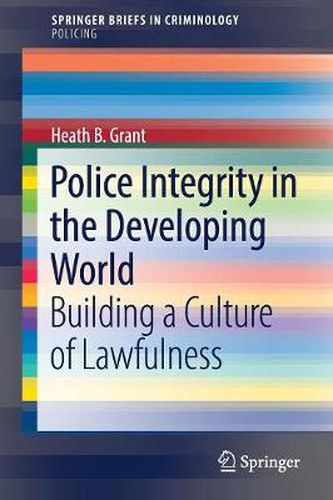Readings Newsletter
Become a Readings Member to make your shopping experience even easier.
Sign in or sign up for free!
You’re not far away from qualifying for FREE standard shipping within Australia
You’ve qualified for FREE standard shipping within Australia
The cart is loading…






This title is printed to order. This book may have been self-published. If so, we cannot guarantee the quality of the content. In the main most books will have gone through the editing process however some may not. We therefore suggest that you be aware of this before ordering this book. If in doubt check either the author or publisher’s details as we are unable to accept any returns unless they are faulty. Please contact us if you have any questions.
This Brief explores the problem of creating organizational change and a culture of lawfulness within police organizations in the developing world. In many countries where police are charged with responding to crime, they are themselves entrenched in histories of corruption, human rights abuses, inefficiency as well as a lack of public trust. While police corruption can happen anywhere, areas of political transition tend to have a more entrenched cultural history of corruption.
However, the author argues that even in the most challenged forces, there remains hope for organizational change. This brief demonstrates how understanding the local socio-political context, and applying evidence-based best practices for police integrity training can bring about change. The brief summarizes the current state of knowledge on police integrity training, strategies for rethinking corruption and community policing, as well as two case studies in Bangladesh and Mexico with applications for other regions.
This work will be of interest to students and researchers in criminology and criminal justice, particularly with an interest in police studies and corruption, as well as related fields such as political science, international studies and human rights.
$9.00 standard shipping within Australia
FREE standard shipping within Australia for orders over $100.00
Express & International shipping calculated at checkout
This title is printed to order. This book may have been self-published. If so, we cannot guarantee the quality of the content. In the main most books will have gone through the editing process however some may not. We therefore suggest that you be aware of this before ordering this book. If in doubt check either the author or publisher’s details as we are unable to accept any returns unless they are faulty. Please contact us if you have any questions.
This Brief explores the problem of creating organizational change and a culture of lawfulness within police organizations in the developing world. In many countries where police are charged with responding to crime, they are themselves entrenched in histories of corruption, human rights abuses, inefficiency as well as a lack of public trust. While police corruption can happen anywhere, areas of political transition tend to have a more entrenched cultural history of corruption.
However, the author argues that even in the most challenged forces, there remains hope for organizational change. This brief demonstrates how understanding the local socio-political context, and applying evidence-based best practices for police integrity training can bring about change. The brief summarizes the current state of knowledge on police integrity training, strategies for rethinking corruption and community policing, as well as two case studies in Bangladesh and Mexico with applications for other regions.
This work will be of interest to students and researchers in criminology and criminal justice, particularly with an interest in police studies and corruption, as well as related fields such as political science, international studies and human rights.